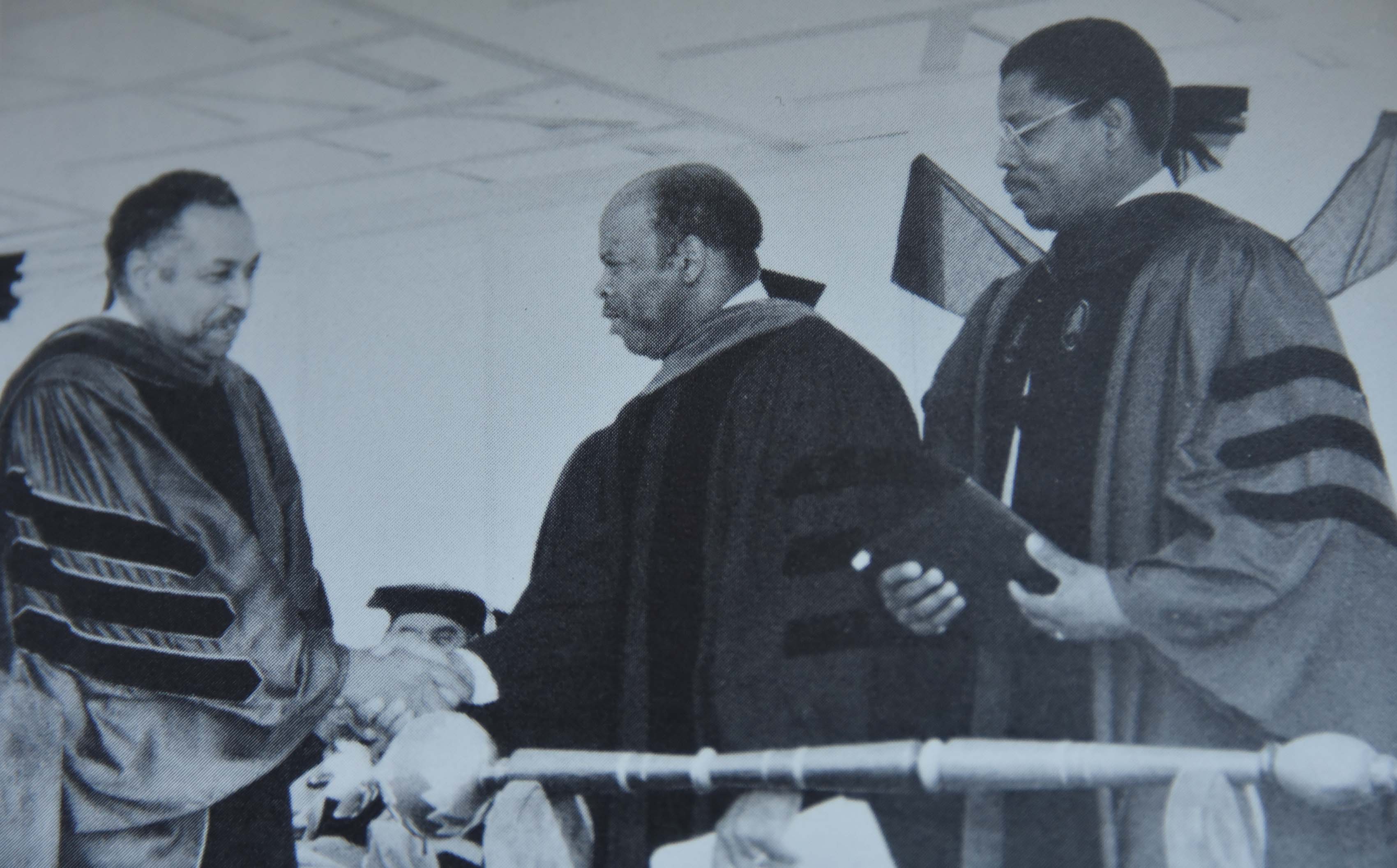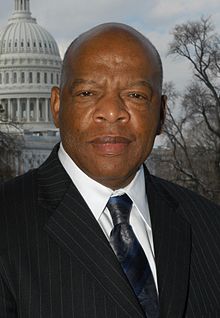
Del State mourns John Lewis passing
Delaware State University joins the nation in the loss of civil rights icon Congressman John Lewis, who passed away on July 17 at age 80.
In addition to being known as the “conscious of Congress” during his 34-year tenure in the U.S. House of Representative, Lewis has long been celebrated as a lion of civil rights who was on the nonviolent front lines of sit-ins, marches and other protests, often subjecting himself to violent assaults and arrests in the 1950s and 60s.
One and a half years after his election to Congress, Lewis accepted the invitation by then-Delaware State College to be its May 15, 1988 Commencement keynote speaker. Del State President William B. DeLauder presented the Congressman with an Honorary Doctoral Degree during that ceremony.
Below is a timeline of John Lewis life as a civil rights activist and legislator.
- Feb. 21, 1940 – John Lewis was born in Troy Alabama, the third of 10 children to sharecroppers Willie Mae and Eddie Lewis.
- 1955 – First heard the Rev. Martin Luther King Jr. on the radio and later that year closely followed the news of the Montgomery Bus Boycott. He would meet Rosa Parks in 1957 and Dr. King a year later.
- 1958 – Enrolled in American Baptist College in Nashville, where he learned the concepts of nonviolent protests from ministers there and the Nashville Christian Leadership Conference (an arm of the Southern Christian Leadership Conference), as well as from the teachings of Mahatma Gandhi. It was during his college years that he began participating in nonviolent sit-in protests.
- April 1960 – Lewis joined others from colleges and civil rights groups in the founding of the Student Nonviolent Coordinating Committee (SNCC). He would emerge as strategist for the SNCC and its field protest projects.
- 1961 – After his graduation from American Baptist College, Lewis enrolled at Fisk University to pursue a degree in religion and philosophy. Later, civil right responsibilities would force Lewis to discontinue his studies there, but he would later resume his enrollment and graduate from Fisk with a A.B. Degree in 1967.
- May 4-Dec. 10, 1961 – Participated as a 21-year-old civil rights activist in the Freedom Rides in protest of the southern states’ failure to comply with the 1960 U.S. Supreme Court ruling that declared segregated interstate bus travel to be unconstitutional. One of the original 13 Freedom Riders, Lewis and his interracial group rode into the Deep South, where he and others were assaulted and arrested several times before the trip was completed near the end of the year.
- 1963 – Elected as the chairman of the Student Nonviolent Coordinating Committee (SNCC), a leadership post he would hold until 1966.
- 1963 – Was one of the “Big Six” leaders who organized the historic Aug. 28, 1963 March on Washington, where Lewis at age 23 would be the youngest speaker. Prior to his death, he was the last living orator from that event.
- 1964 – Coordinated the SNCC’s efforts for the Mississippi Freedom Summer, a campaign to register black voters across the South and expose college students from around the country to the perils of African American life in the South.
- March 7, 1965 – Lewis and Southern Christian Leadership Conference activist Hosea Williams led about 600 marchers on the beginning of a 54-mile Selma to Montgomery protest march. After they crossed the Edmund Pettus Bridge, the protestors were attacked by Alabama State troopers who launched tear gas and brutally assaulted the protestors with nightsticks. That day became known as “Bloody Sunday” in the annals of American civil rights. Lewis suffered a fractured skull in the attack, and bore the scars on his head for the rest of his life.
- 1966 – Lewis took a job as the associate director of the Field Foundation of New York, and organization that focused on minority group issues. He held that position for one year.
- 1967 – Lewis became the director of the Southern Regional Council’s Community Organization Project
- 1968 – Married Xemona Clayton, which would be a 44-year union that produced one son, John-Miles Lewis. Mrs. Xemona Lewis passed away in 2012.
- 1970 – Lewis became the director of the Voter Education Project (VEP). Under his seven-year leadership VEP added nearly four million voters to the rolls.
- April 1977 – In his first election bid, Lewis was defeated by Wyche Fowler Jr. for a vacant U.S. House of Representative seat.
- 1978 – Under the Administration of President Jimmy Carter, Lewis accepted the position of associate director of ACTION, which was responsible for running the VISTA program, the Retired Senior Volunteer Program, and the Foster Grandparent Program. He served in that position for 2½ years.
- 1981 – Lewis won the at-large seat on the Atlanta City Council, and would serve as a councimanl until 1986.
- 1986 – After upsetting Georgia State Rep. Julian Bond in the Democratic primary, Lewis went on to defeat Republican Portia Scott to win Georgia’s Fifth Congressional District U.S. House of Representative seat. Lewis was reelected 16 times, six times as an unopposed incumbent.
- 1997 – Lewis was honored with a sculpture by Thornton Dial, entitle The Bridge at Ponce de Leon Avenue and Freedom Park in Atlanta, Ga.
- 1991 – Lewis became the Senior Chief Deputy Whip in the Democratic caucus.
- 1998 – Walking with the Wind, Lewis’ 1998 autobiography, was published.
- 2001 – The John F. Kennedy Foundation awarded Lewis the Profile in Courage Award
- 2003 – After introducing legislation 15 times since 1988 for the creation of a national African American museum in Washington, D.C., Lewis finally gained bipartisan support in 2003, and bill was signed into law by President George W. Bush, resulting in the 2016 opening of the National Museum of African American History and Culture.
- 2006 – The Jefferson Awards presented Lewis with the U.S. Sen. John Heinz Award for Greatest Public Service by an Elected or Appointed Official.
- 2006 – When protesting in front of the Sudan Embassy over the genocide in Darfur, Lewis was arrested. In 2009, he was arrested again for protesting in front of the same embassy for the same cause.
- February 2008 – After originally supporting Hillary Clinton’s run for the Democratic presidential nomination, Lewis switched his superdelegate vote to Barack Obama, helping to change to course of the campaign in favor of the future first-ever African American President.
- 2010 – The Lyndon Baines Johnson Foundation presented the First LBJ Liberty and Justice Award.
- 2011 – President Barack Obama presented Lewis with the Presidential Medal of Freedom.
- 2012 – Across That Bridge – A Vision for Change and the Future of America, a book that draws on Lewis’ civil rights activism experience, was published.
- 2013 – Co-authored and published the first of a trilogy of graphic novels about the civil rights movement entitled March: Book One. The other two novels of the trilogy were published in 2015 and 2016, in all making him the first member of Congress to author a graphic novel.
- June 22, 2016 – Lewis and Rep. Katherine Clark (D-Mass.) led a 26-hour sit-in by House Democrats on the floor of the House Chamber to demand a vote on gun-safety legislation in the aftermath of the Orlando nightclub shooting.
- 1986-2017 – During Lewis’ congressional tenure, he served on the Committee on Ways and Means (and served as the chair of its Oversight Subcommittee) and on the U.S. Congress Joint Committee on Taxation. He was also a member of more than 40 congressional caucuses.
- Dec. 29, 2019 – Lewis announced that he was suffering from stage IV pancreatic cancer.
- July 17, 2020 – Congressman John Lewis died at age 80.

